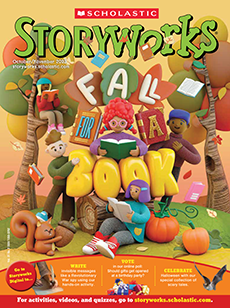Three hours later, a weary assistant director announced, “Thirty-minute break!” We still hadn’t gotten the shot. I felt like a total failure.
My mom gave me water, and Bruce patted my shoulder.
“I’m so bad at this,” I moaned. “You make it look easy!”
“I’ve been acting for a long time,” Bruce said. “This is all new for you.”
“Just remember to breathe,” my mom said.
I held back tears. “Can I have a minute alone?”
I wandered over to the table with the backup Squeakers all lined up . . . backup Squeakers like me, the backup kid. They looked so cute and friendly, not nervous and terrified.
“Why can’t I get it right?” I asked, picking one up. Then I made Squeakers answer in my best squeaky mouse voice. “You can do it, Sophia. All you have to say is ‘Who’s gonna mop that up?’ ”
“Did Squeakers just talk?!”
I was surprised to find Gina standing next to me.
“That was me,” I confessed. “I like talking in funny voices. I do it all the time. Gina, I’m so sorry I keep messing up. Squeakers could probably do a better job than me.”
The director’s eyes lit up. “Sophia, say your line again. Only this time, in that funny Squeakers voice.”
I held Squeakers in front of my face and said, “Who’s gonna mop that up?”
Gina looked like she’d won the lottery. “Sophia, you’re brilliant!”
“What?” I said.
“We don’t need a kid for that line. We’ll use the mouse. You can do the voice offstage.”
“So I won’t be in the commercial after all?” All my hopes of stardom were fading away.
“Of course you’ll be in the commercial. Just not on camera.”
I was speechless for a moment. How could I be famous if I only did a squeaky mouse voice?
“But then nobody will see me,” I said softly.
The makeup guy overheard me. “Nobody sees me either,” he said. “But there wouldn’t be a commercial without me.”
“Or me,” said the microphone guy.
“Or me!” Gina added. “What do you say, Sophia?”
It wasn’t what I’d dreamed of. But it was something else. And maybe it was something better: We were a whole team creating something together.
In the end, the commercial was edited so it looked like Squeakers was saying, “Who’s gonna mop that up?” Then Bruce acted surprised to hear his mouse talk and replied, “My Squeaky Clean Mop, that’s who!”
And that’s how I, Sophia Sun, became the voice of Squeakers the Mouse in the Squeaky Clean Mop ads.


